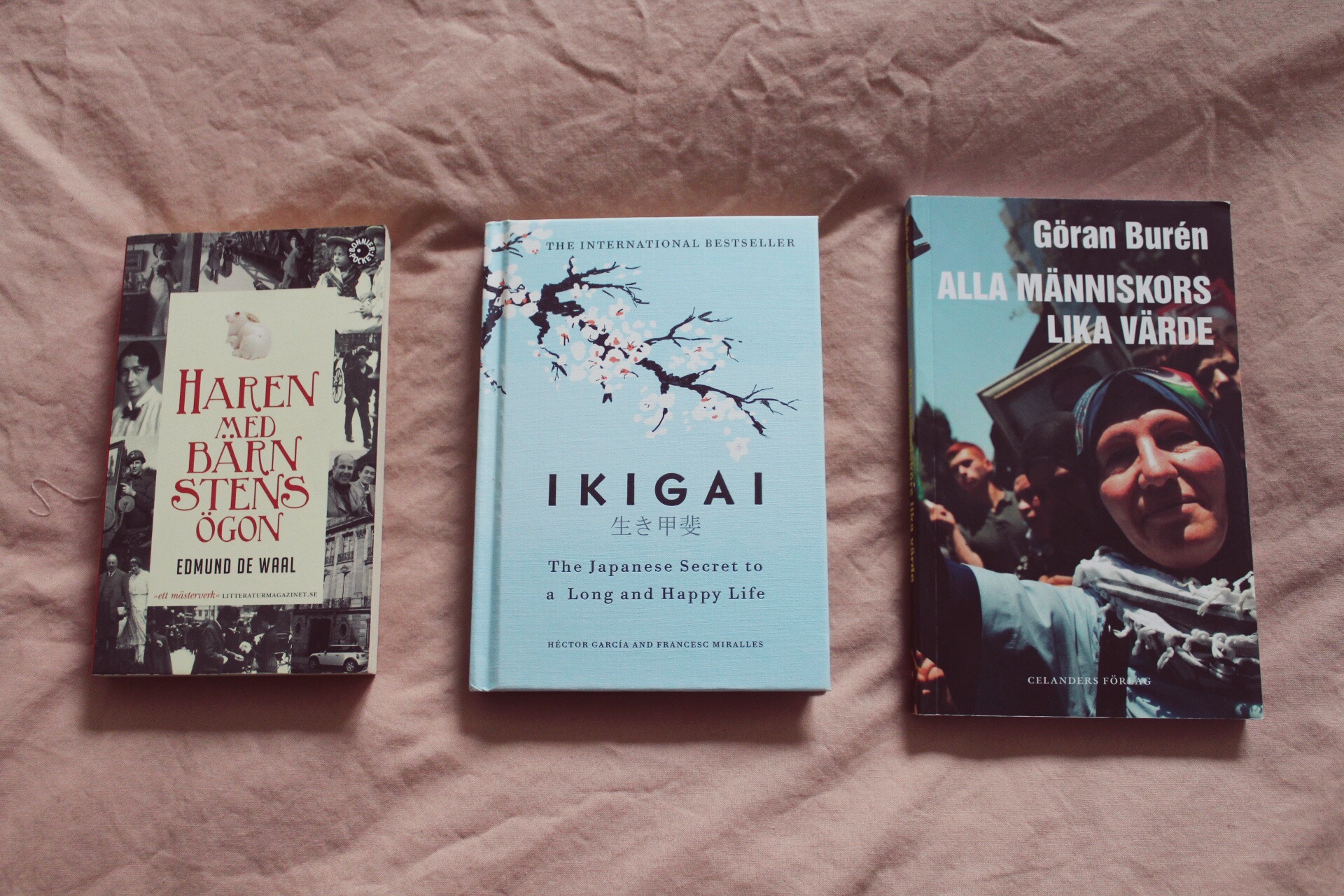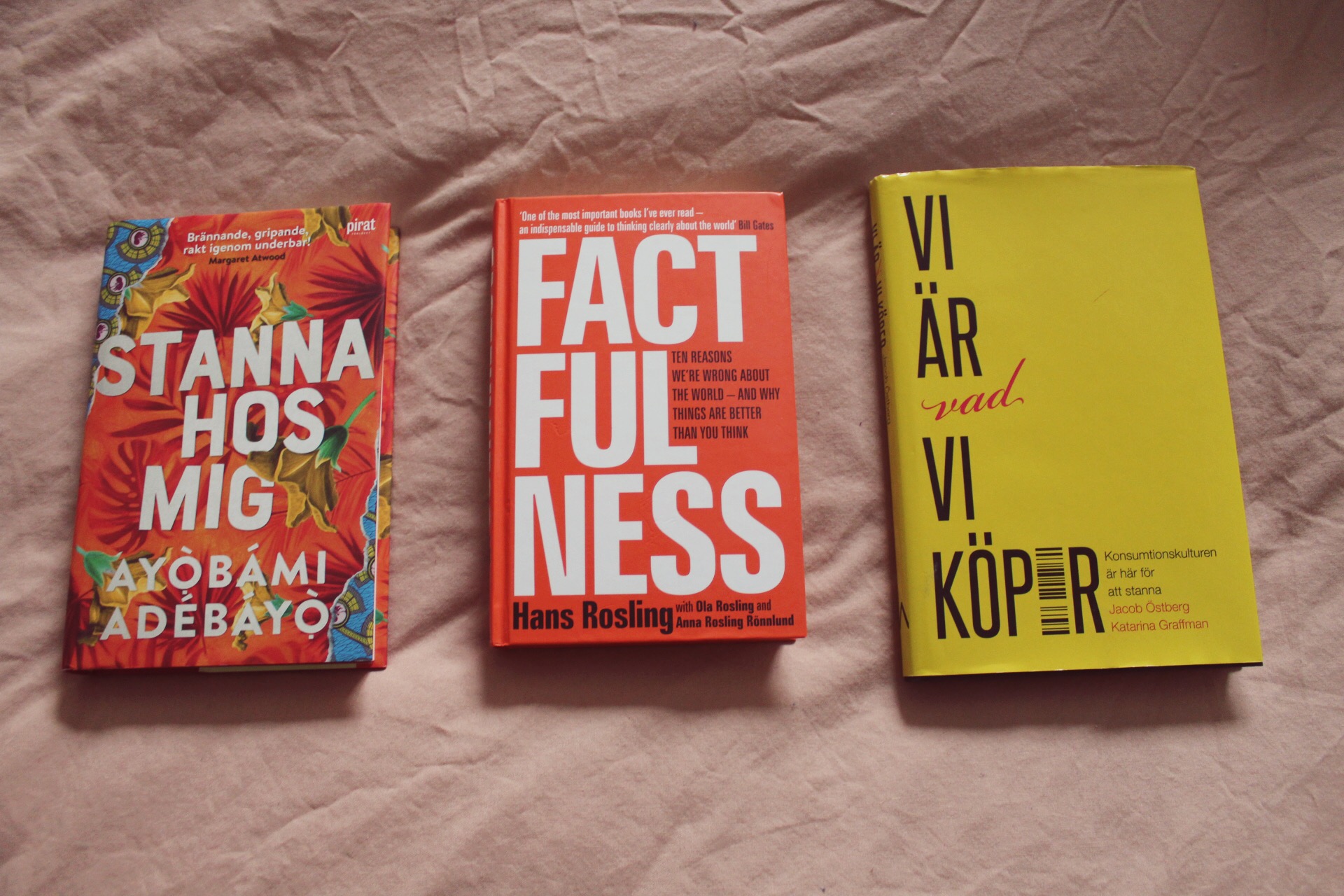A year of great and interesting learnings. A year of worrying politics and fake news. But a year of insights that will most definitely lead to action, as a momentum is building around a more conscious and sustainable way of living. These insights have come from the news, from individuals and people on Instagram, and from books.
When it comes to films and TV series I’m definitely someone who prefers documentaries or something ‘based on a true story’. This is also true for the books I read. I read fiction every now and then, but I’m increasingly reading more non-fiction and I guess it comes down to me always wanting to learn something new and I get greater satisfaction in this sense from interesting non-fiction than fiction.
2018’s reading list
I’ve read fairly different kinds of books this year but the ones I’ve enjoyed the most have been related to something I’ve experienced during the year, or something I’ve been doing with work, or something I’ve become more interested in over the year. I’ve mixed Swedish and English this year, but some of the books I’ve read in Swedish were originally written in English.

The hare with amber eyes (Swedish: Haren med bärnstensögon) – Edmund de Waal
Written by artist de Waal about the collection of miniature sculptures that has been in his family for over a century. The book is also a very moving family history about a wealthy Jewish dynasty that lost everything during the Second World War and these family tragedies are so important to remember. To remember how badly people have been treated over time and to not let it continue. ‘The hare with amber eyes’ is also a story of treasuring the things we keep over time and pass down through generations. Making them last, letting them tell a story of family, hardship, art and dedication.
Ikigai – Hector Garcia and Francesc Miralles
I hadn’t heard about the concept of Ikigai before but as I was researching slow living and doing things that make you happy, it came up. I was intrigued right away so felt like I had to buy it right away to find out more. Ikigai is a Japanese concept that’s about ‘the happiness of being busy’ and about finding the intersection of what you’re good at and what you enjoy doing. It’s a great read for anyone wanting to take their career to the next level, doing something meaningful, but it’s also been a useful read as part of my conscious journey. An exploration of slow living, doing things you enjoy and that make you happy.
Alla människors lika värde – Göran Burén
As part of my job this year I’ve been working with conflict transformation and with social entrepreneurs working in conflict areas. One such entrepreneur was a truly inspiring young woman from Gaza who is trying to run businesses and re-build a society that’s still in the middle of a conflict. Through her I got to see first hand how hard people are working to create change but how difficult it is. It is of course a very complicated conflict but reading about it helps us, if not to understand it, then at least to understand how complex it is. This book went way back through the conflict, and from a Swedish perspective it’s looking at how difficult it is to follow something like this from afar and to ‘take sides’. These conflicts may not be directly taking place in our own countries but they affect all of us. Through politics or people and through the stories of families and friends.

Stay with me (Swedish: Stanna hos mig) – Ayobami Adebayo
I went to Nigeria in the beginning of the year and it was a trip that really made an impression on me. So many people with great entrepreneurial ideas and a passion to create social change but a lot of struggles and hardship. 200 million people trying to survive poverty and a culture that’s not always working in their favour. This book touches on the, in our eyes potentially, old-fashioned family traditions affecting gender stereotypes and roles. It’s a very moving story of a young woman struggling to get pregnant with her husband, which means, in her community and family, she’s not seen as a real woman. I found it really interesting, both from a Nigerian culture perspective as well as from the perspective of womanhood. What does it mean, what’s expected of us and what does it do to us and those around us.
Factfulness – Hans Rosling with Ola Rosling and Anna Rosling Rönnlund
In the prime time of fake news, filter bubbles and polarisation, this is of course a very important book. And it’s indeed a very informative read. Writing it was the last thing Hans Rosling did before he sadly passed away in February 2017, and after a lifetime dedicated to science, and in recent years statistics through Gapminder, he saw it as an important mission to share his learnings in this book. Throughout the various chapters he shows us how the world has developed and that it’s not as bad as many call it out to be. Less people are dying from diseases and more people are able to live decent lives. I don’t necessarily believe in simplifying things too much, especially not when it comes to climate change because I see it as a huge threat, but to meet our challenges and find realistic solutions we also need to be clear with facts and take a holistic approach. I also can’t help questioning the complex aspects of ‘the world is getting better’. Yes it’s of course better that less people are living in extreme poverty, but the growth of the middle class is a different issue. What does a better living standard do to us? Does it make us happier or are we also seeing an increase in mental health issues? And what does it do to our planet? We know that well-developed countries like Sweden are consuming as if we had several Planet Earth to use, so for an increasing amount of people to start living like this, we’d see increased issues for the planet. These are very difficult questions, and we don’t get any answers in Rosling’s book but reading it gives us a good ground to stand on, to then continue discussing these issues, and hopefully find sustainable solutions.
Vi är vad vi köper (Eng. translation: We are what we buy) – Jacob Östberg and Katarina Graffman
As I’ve been travelling down this path of conscious consumption and slow living, I’ve been getting more and more interested in the culture around consumption. Not just about how much we buy, but how we buy and how we can change the way we consume, in order to save the planet. In 2018, I’ve been reading a fair bit on the topic and this book was a great read to explore what affects our consumption patterns. The book explores how our peers and location affect our consumption. How our things define who we are, but also how, by owning a certain thing, we can act in a certain way. It was also an interesting read in terms of conscious consumption and what will make us shift into a more sustainable way of consuming. I’m aiming to read more on this topic in 2019 to explore further what we as people, and I, as someone who writes on the topic, can do to make it in to an even bigger movement. So if you’ve got any tips on other books I should be reading then please do send them my way!

